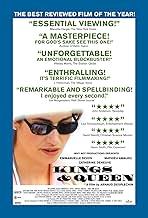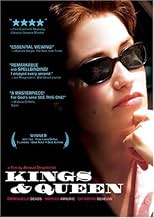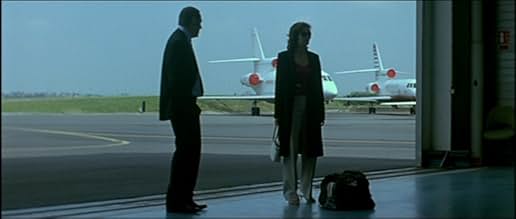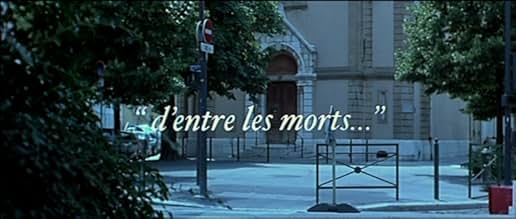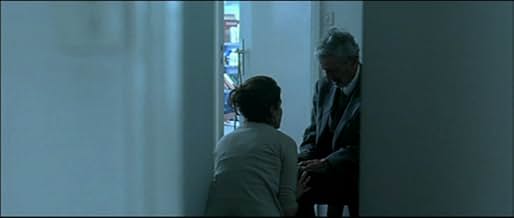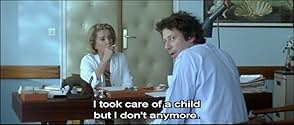IMDb रेटिंग
7.0/10
4.1 हज़ार
आपकी रेटिंग
समानांतर कहानियां दो पूर्व प्रेमियों के संबंधों की वर्तमान स्थिति बताती है: नोरा एक अकेली माँ है जो अपने बीमार पिता की देखभाल करने के लिए आती है; जिसको पागलों के वार्ड में रखा गया है, एक शान... सभी पढ़ेंसमानांतर कहानियां दो पूर्व प्रेमियों के संबंधों की वर्तमान स्थिति बताती है: नोरा एक अकेली माँ है जो अपने बीमार पिता की देखभाल करने के लिए आती है; जिसको पागलों के वार्ड में रखा गया है, एक शानदार संगीतकार, इस्माइल अपने भागने की साजिश रचता है.समानांतर कहानियां दो पूर्व प्रेमियों के संबंधों की वर्तमान स्थिति बताती है: नोरा एक अकेली माँ है जो अपने बीमार पिता की देखभाल करने के लिए आती है; जिसको पागलों के वार्ड में रखा गया है, एक शानदार संगीतकार, इस्माइल अपने भागने की साजिश रचता है.
- निर्देशक
- लेखक
- स्टार
- पुरस्कार
- 9 जीत और कुल 18 नामांकन
फ़ीचर्ड समीक्षाएं
10Fiona-39
There is SO much going on in this film, but it has rhythm, pace, a great soundtrack, and enjoyable, charismatic performances, that kept me engaged from the word go. The editing owes something to 60s Godard - lots of jump cuts in the dialogue scenes - and 80s Rohmer - anguished 30 somethings worrying about true love - and possibly, in its tour de force final sequence, a reference to La Jetee, which is also of course about memory, fate, and mortality. And then there is the rather bizarre Audrey reference which opens the film: as Nora steps out of a black car, clutching her morning coffee, clothed in black, her hair wound up on her head, the strains of Monn River sound. So far, so post-modern. This is is a film that is freighted with filmic, literary, theatrical (esp Shakespeare and the Tempest) and artistic allusions, but that uses these in service of a specific point: that these cultural references and allusions make the web of our being - that art is how we communicate to each other (notice that all the characters communicate through art - the gift Nora gives her father, the music Ismael dances to, the book the father writes - even the 'murder scene' is filmed through a highly stylised mise-en-scene): that 'artifice' can reveal the deepest and most moving of human emotions. It is a beautiful film that will move you and make you leave the cinema feeling transported. And Deneuve is just great! I love the bit where Ismael asks her if anyone has ever told her she's beautiful, and she gives a slight twist of her lips, sighs, and says, yes, she has heard that before. Just because something has become cliché, doesn't mean it's not true.
(San Francisco Film Festival showing, March 22, 2005) An amazing if somewhat indigestible film, Desplechin's KINGS AND QUEEN (Rois et reine) is a genre-bending family drama that alternates wired comedy with solemn tragedy, in particular nutty violist Ismaël's (Mathieu Amalric's) tax problems and sudden third-party commitment to a mental hospital and ex-girlfriend Nora's (Emmanuelle Devos') discovery that her writer father is dying of advanced stomach cancer. Meanwhile Nora is haunted by memories of the father of her young son Elias (Valentin Lelong), is about to marry a rich "gangster," and other relatives wander in and out of a tumultuous narrative which alternates present tense scenes with flashbacks, dreams and fantasies. Buffoonery and melodrama, which are sometimes hard to separate, turn out to work well together as director Desplechin modestly points out is true of Shakespeare, whose King Lear may have given him the idea for the brutal, vindictive final letter Nora's father, Louis Jenssens (Maurice Garrel) leaves for her. The audience at the SFFF cheered a gratuitous sequence where Ismaël's father Abel (Jean-Paul Roussillon) singlehandedly subdues three punks trying to rob his convenience store while Ismaël looks on with terror. In the next scene, father and son are lifting weights together at a health club. The plan by Abel, who was himself adopted, to adopt a man who's lived with him and his wife for years, over the protests of his adult children, rhymes palpably with the question of Ismaël's adopting Elias, who doesn't like Nora's new man, Jean-Jacques (Olivier Rabourdin). The long scene where Ismaël explains to Elias why he can't adopt him, while they walk through a museum, is one of a number of tours de force.
Secondary characters in this overwritten but always entertaining drama make themselves hard to forget though buffoonery in the case of the Ismaël's junkie lawyer (Hypolytte Girardot); though their neediness, in the case of Arielle, "la Chinoise" a flirtatious 'princess' at the psych hospital, (Magalie Woch) or Nora's sister down-and-out Chloé, (Nathalie Boutefeu); bitchiness in the case of Ismaë's sister. Ismaël's usual shrink is a huge African grande dame; he gets his entrance exam and his walking papers at the hospital from none other than Catherine Deneuve (whose iciness and soulfulness would be an unforgettable blend even if she were not already one of the world's most beautiful sixty-somethings). The women are goddesses, bitches, or queens. Ismaël says women have no souls; but the story's main men are talented but narcissistic problem children. Elias seems poised to grow up into one of those too. Most of the acting is remarkable, or at the very least arresting. The mercurial Amalric and lovely Devos completely live up to their top billing. Still, even their parts might have done with some trimming back.
The movie comes with allusions to Leda and the Swan, Nietsche, Yeats, Emily Dickenson, and a large number of musical references including rap (and a break dancing demo by Ismaël at the mental hospital), Klezmer, Randy Newman and, as a framing device, Moon River. Suspicions that there may be too much going on here are stifled by sheer pleasure in the drama of it all.
Six César nominations in France, where it opened in late 2004.
The title may refer to Shakespeare's plays, or to the way paterfamilias are seen by their children. "Kings and Queen" is wildly unedited and at 2 ½ hours definitely too long; Desplechin even acknowledged repeatedly that his answers to questions after the SFFF showing were too long too. But his inability to edit his work down may be hard to separate from his unique flavor and charm. Desplechin wrote the excellent screenplay for "Un monde sans pitié" ("A World Without Pity," 1989) the story of a fascinating young loser. "Desplechin is a wonder with actresses, at least as long as they're with him: Devos' character is close enough to 'My Sex Life' star and former Desplechin paramour Mariane Denicourt that she responded to the movie with a retaliatory roman à clef," writes Sam Adams in the Philadelphia City Paper. A question about this contretemps met with a flurry of interesting doubletalk from the soft-spoken director.
Secondary characters in this overwritten but always entertaining drama make themselves hard to forget though buffoonery in the case of the Ismaël's junkie lawyer (Hypolytte Girardot); though their neediness, in the case of Arielle, "la Chinoise" a flirtatious 'princess' at the psych hospital, (Magalie Woch) or Nora's sister down-and-out Chloé, (Nathalie Boutefeu); bitchiness in the case of Ismaë's sister. Ismaël's usual shrink is a huge African grande dame; he gets his entrance exam and his walking papers at the hospital from none other than Catherine Deneuve (whose iciness and soulfulness would be an unforgettable blend even if she were not already one of the world's most beautiful sixty-somethings). The women are goddesses, bitches, or queens. Ismaël says women have no souls; but the story's main men are talented but narcissistic problem children. Elias seems poised to grow up into one of those too. Most of the acting is remarkable, or at the very least arresting. The mercurial Amalric and lovely Devos completely live up to their top billing. Still, even their parts might have done with some trimming back.
The movie comes with allusions to Leda and the Swan, Nietsche, Yeats, Emily Dickenson, and a large number of musical references including rap (and a break dancing demo by Ismaël at the mental hospital), Klezmer, Randy Newman and, as a framing device, Moon River. Suspicions that there may be too much going on here are stifled by sheer pleasure in the drama of it all.
Six César nominations in France, where it opened in late 2004.
The title may refer to Shakespeare's plays, or to the way paterfamilias are seen by their children. "Kings and Queen" is wildly unedited and at 2 ½ hours definitely too long; Desplechin even acknowledged repeatedly that his answers to questions after the SFFF showing were too long too. But his inability to edit his work down may be hard to separate from his unique flavor and charm. Desplechin wrote the excellent screenplay for "Un monde sans pitié" ("A World Without Pity," 1989) the story of a fascinating young loser. "Desplechin is a wonder with actresses, at least as long as they're with him: Devos' character is close enough to 'My Sex Life' star and former Desplechin paramour Mariane Denicourt that she responded to the movie with a retaliatory roman à clef," writes Sam Adams in the Philadelphia City Paper. A question about this contretemps met with a flurry of interesting doubletalk from the soft-spoken director.
Nora (the devastating and luminous Emmanuelle Devos) is a single mother who suddenly has to care for her dying father (a successful writer straining to put the finishing touches on his last book, a memoir of sorts) on the eve of marrying her new suitor. Ismael (the fantastic Mathieu Amalric) is her "ex-boyfriend" who cared for her son most of the boy's life, and is a struggling musician who suddenly finds himself trapped in the loony bin thanks to an over-zealous sister, a bitter friend, and a "judicial error." Director Desplechin (this is the only film I have seen of his) does a nice job flipping back and forth between the utter bleakness and emotional hell of caring for a dying parent, and the absurd serio-comic-horror of being stuck in the "crazy hospital" against your will.
There's a lot of play with psychoanalysis (highlighted by Catherine Denueve in a bit part as a psychiatrist) that is fun and illuminating to watch. There's speckles of romance, dark humor, nihilism, magic realism, and soap opera theatrics with lots of references to philosophy, mythology, and poetry that keep the film interesting and unpredictable even as its over two and a half hour run time tries your patience. There are plenty of revelations and big emotional payoffs here punctuated well with eclectic music choices (everything from classical pieces to some sort of catchy European hip-hop) and nice little surprises (Magalie Woch is delightful as the lovely suicidal mental patient who becomes smitten with Ismael). This utterly French film gives the viewer a lot to chew on, even if you have to gnaw through a bit of gristle before dining on the filet mignon.
There's a lot of play with psychoanalysis (highlighted by Catherine Denueve in a bit part as a psychiatrist) that is fun and illuminating to watch. There's speckles of romance, dark humor, nihilism, magic realism, and soap opera theatrics with lots of references to philosophy, mythology, and poetry that keep the film interesting and unpredictable even as its over two and a half hour run time tries your patience. There are plenty of revelations and big emotional payoffs here punctuated well with eclectic music choices (everything from classical pieces to some sort of catchy European hip-hop) and nice little surprises (Magalie Woch is delightful as the lovely suicidal mental patient who becomes smitten with Ismael). This utterly French film gives the viewer a lot to chew on, even if you have to gnaw through a bit of gristle before dining on the filet mignon.
Rois et Reine starts and ends with an audio feast of divinely beautiful unplugged "Moon River". In between, it offers the richest content that I remember in any film that I've seen.
Use of two parallel, initially apparently unrelated story lines is a favourite structure for movie makers. One that immediately comes to mind is Le Huitieme Jour. In Rois et Reine, one thread is Nora, a beautiful art gallery director struggling with a terminally ill father and a fatherless son Elias. The other thread is Ismael, a viola player taken into a psychiatric ward through strange circumstances. However, it does not take long (relative to the two-and-a-half-hour film) to get to the convergence point where the audience are privy to the fact that Nora and Ismael had lived together for seven years during which Nora's son developed a devoting affection for and attachment to Ismael (which, incidentally, reminds me of a similar relationship in Love Actually, in a character played by Liam Neeson).
But this is only the bare beginning. The sprawling story surrounding these two main characters commands the viewers' every attention, and this film really deserves several viewing.
I wouldn't attempt to go into all the details of the many characters, sub-plots and sub-texts. Briefly, the central story is Nora's relationships with three men, Elias's father who was shot under suspicious circumstances, Ismael who became Elias's de facto father and the man she is now going to marry but is not really certain if she truly loves or not. While those relationships are touched on lightly, some through flashbacks, her relationship with her father Louis and sister Chloe receive sharper focus, with twists and turns leading to some rather devastating revelations towards the end.
With Ismael's family (and there are quite a few members) the circumstances are very different, but equally intriguing. While there is also conflict, and this one centres around the issue of adoption and estate, the mood in one of wry humour. Family matters aside, there is also another dimension, the psychiatric ward, where Ismael interacts with no less than three psychiatrists (one played by Catherine Deneuve) as well as a women fellow-patient Arielle with whom he develops a close relationship that continues after their discharge.
And don't be mislead into thinking that quantity will compromise quality. The entire film is throbbing with energy, telling the story in so many different ways, in so many changing moods, which, however, never feels disjointed. Similarly, the deft use of background music brings you delight in every turn.
I have only touched on the bare surface of this absorbing film. Among the many fascinating aspects of the film is the development of the two main characters and a common characteristic: both are vain and arrogant. Yet, the interesting thing is that they are not portrayed in that light at all. It's through the description by other characters that this comes to light, and then we are compelled to look behind the surface to understand.
The audience will find that there are many scenes, from devastatingly emotional to hilariously noire, that they will remember long afterwards. If I were to pick a most memorable one, however, it will be the last scene, between Ismael and Elias, and I think many who have seen the film will agree. A masterful piece of auteurist work, Rois et Reine is a film that will be a crime to miss.
Use of two parallel, initially apparently unrelated story lines is a favourite structure for movie makers. One that immediately comes to mind is Le Huitieme Jour. In Rois et Reine, one thread is Nora, a beautiful art gallery director struggling with a terminally ill father and a fatherless son Elias. The other thread is Ismael, a viola player taken into a psychiatric ward through strange circumstances. However, it does not take long (relative to the two-and-a-half-hour film) to get to the convergence point where the audience are privy to the fact that Nora and Ismael had lived together for seven years during which Nora's son developed a devoting affection for and attachment to Ismael (which, incidentally, reminds me of a similar relationship in Love Actually, in a character played by Liam Neeson).
But this is only the bare beginning. The sprawling story surrounding these two main characters commands the viewers' every attention, and this film really deserves several viewing.
I wouldn't attempt to go into all the details of the many characters, sub-plots and sub-texts. Briefly, the central story is Nora's relationships with three men, Elias's father who was shot under suspicious circumstances, Ismael who became Elias's de facto father and the man she is now going to marry but is not really certain if she truly loves or not. While those relationships are touched on lightly, some through flashbacks, her relationship with her father Louis and sister Chloe receive sharper focus, with twists and turns leading to some rather devastating revelations towards the end.
With Ismael's family (and there are quite a few members) the circumstances are very different, but equally intriguing. While there is also conflict, and this one centres around the issue of adoption and estate, the mood in one of wry humour. Family matters aside, there is also another dimension, the psychiatric ward, where Ismael interacts with no less than three psychiatrists (one played by Catherine Deneuve) as well as a women fellow-patient Arielle with whom he develops a close relationship that continues after their discharge.
And don't be mislead into thinking that quantity will compromise quality. The entire film is throbbing with energy, telling the story in so many different ways, in so many changing moods, which, however, never feels disjointed. Similarly, the deft use of background music brings you delight in every turn.
I have only touched on the bare surface of this absorbing film. Among the many fascinating aspects of the film is the development of the two main characters and a common characteristic: both are vain and arrogant. Yet, the interesting thing is that they are not portrayed in that light at all. It's through the description by other characters that this comes to light, and then we are compelled to look behind the surface to understand.
The audience will find that there are many scenes, from devastatingly emotional to hilariously noire, that they will remember long afterwards. If I were to pick a most memorable one, however, it will be the last scene, between Ismael and Elias, and I think many who have seen the film will agree. A masterful piece of auteurist work, Rois et Reine is a film that will be a crime to miss.
"Rois et reine" aka "Kings and Queen" (2004) directed by Arnaud Desplechin is a most unusual film that mixes expertly comical and tragic, unbearable and optimistic, life and death that are intertwined in the story of two former lovers whose lives have crossed once more when they least expected. Nora (Devos) has to take care of her dying father. Ismael (Almaric), a talented but neurotic musician (Roman Polansky + Woody Allen) is mistakenly committed to a mental hospital under the care of a clinical psychiatrist, forever young and still the most beautiful woman in the world, Catherine Denueve. ("Do you know that you are very beautiful"? - asked Ismael. "I've been told", smiles she). I still think about the movie - the complicated relationships between one woman and several men in her life - how much she affected them, sometimes, with tragic consequences. This is also the movie about perception - how big is the difference between the way we see ourselves and the others see us and what they think of us in reality. It is a movie about love - is it always blind? Is it possible to love deeply and see with the clear eyes? I was totally engrossed and heartbroken by some scenes involving Devos's caring for her dying father, by the flashbacks that tell about her relationship with the father of her son, and next minute I was laughing out loud following the Almaric's ordeal in a mental hospital and his attempts to escape. The movie could've been a gem but it is too long, has too many characters that were perhaps very interesting but I never knew what happened to them and it could be confusing due to its broken narrative which was OK by me but the final result even compelling and memorable was not completely satisfying. Both Mathieu Almaric and Manu Devos are marvelously talented actors and they were the main reason that overlong and confusing movie worked. I hope to see both Almaric and Devos in many more movies. I remember Devos since the first movie I saw her in - "Sur Mes Levres" and I knew then that she had all potentials to become a great actress. Her acting in "Rois et reine" confirmed my first impression.
क्या आपको पता है
- ट्रिवियाThe title of the movie was inspired to Arnaud Desplechin by the five first lines of a poem by Michel Leiris: "Rois sans arrois Reine sans arène Tour trouée Fou à lier Cavalier seul"
- भाव
Nora Cotterelle: There are four men I loved. I killed two of them.
- कनेक्शनReferenced in Trust the Man (2005)
- साउंडट्रैकPavane pour une Infante défunte
Composed by Maurice Ravel
टॉप पसंद
रेटिंग देने के लिए साइन-इन करें और वैयक्तिकृत सुझावों के लिए वॉचलिस्ट करें
- How long is Kings & Queen?Alexa द्वारा संचालित
विवरण
- रिलीज़ की तारीख़
- कंट्री ऑफ़ ओरिजिन
- आधिकारिक साइटें
- भाषाएं
- इस रूप में भी जाना जाता है
- Kings & Queen
- फ़िल्माने की जगहें
- उत्पादन कंपनियां
- IMDbPro पर और कंपनी क्रेडिट देखें
बॉक्स ऑफ़िस
- बजट
- €38,71,153(अनुमानित)
- US और कनाडा में सकल
- $2,90,973
- US और कनाडा में पहले सप्ताह में कुल कमाई
- $16,101
- 15 मई 2005
- दुनिया भर में सकल
- $38,39,556
- चलने की अवधि
- 2 घं 30 मि(150 min)
- रंग
- ध्वनि मिश्रण
- पक्ष अनुपात
- 2.35 : 1
इस पेज में योगदान दें
किसी बदलाव का सुझाव दें या अनुपलब्ध कॉन्टेंट जोड़ें

